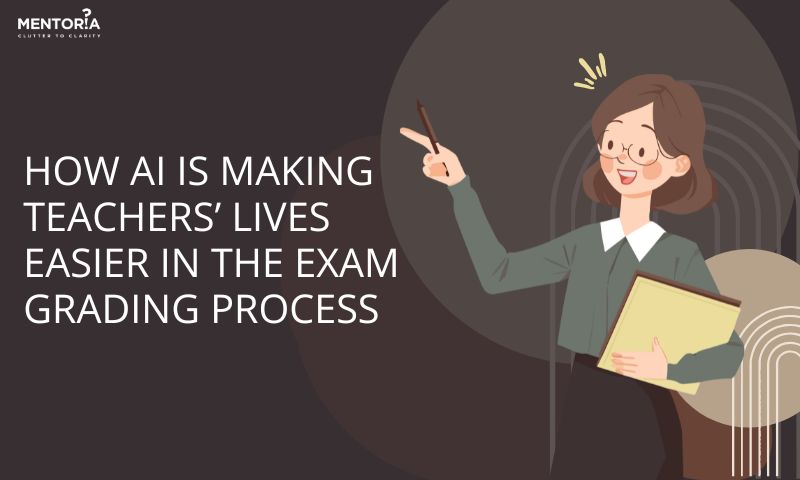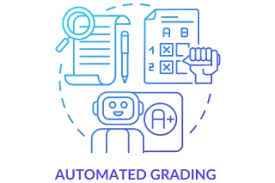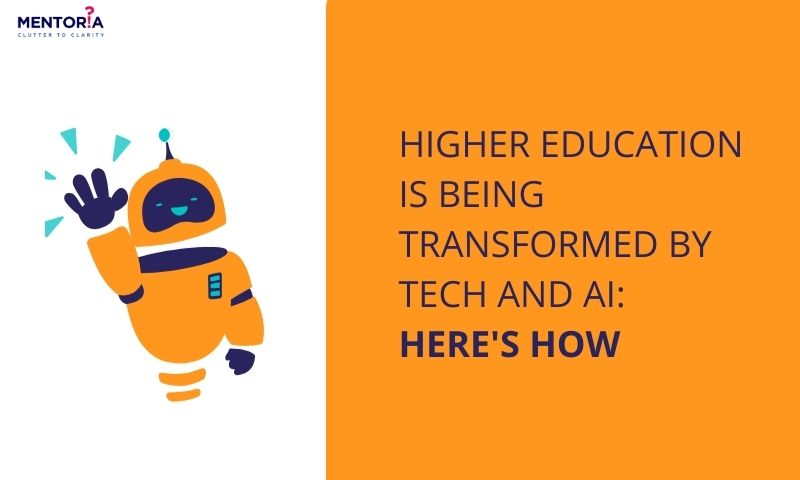How AI Is Making Teachers’ Lives Easier In The Exam Grading Process

We weren’t lying when we said AI is everywhere now. As the world advances towards an AI life, so does the field of education. One of the most tedious and time-consuming tasks for teachers has always been grading exams. However, with the advent of AI, this process is becoming significantly streamlined, allowing teachers to focus more on teaching and less on administrative burdens.
According to a report by HolonIQ, the global market for AI in education is expected to reach 6 billion USD by the year 2025. Additionally, the average growth between 2020 and 2025 will see an increase with a growth rate of 47%. This growth is driven by AI’s ability to enhance learning experiences and simplify administrative tasks such as grading.
Let’s dive into how AI is transforming exam grading, making it a smoother and more efficient process.
Understanding AI-Based Grading
What Is AI-Based Grading?
AI-based grading uses smart computer systems to evaluate and grade exams. These systems can handle multiple-choice questions, short answers, essays, and even tricky problem-solving tasks! They offer accurate and unbiased results, and often do it much faster than traditional grading methods. So, it is basically as efficient as a teacher grading an answer sheet and the student is lucky if they’ve been a naughty student and the teacher holds a vendetta against them!
How Does It Work?
AI grading systems are trained on a massive collection of graded work. They learn to spot patterns and identify key elements of good responses. For example, AI can check an essay for structure, coherence, grammar, and relevance to the topic, all in a fraction of the time it would take a human teacher. So in such a case, a student won’t have to go to their teacher and complain that she didn’t grade them well despite them writing a great essay!
Benefits Of AI In Exam Grading
Say a student has just finished writing a killer essay for their exam. Instead of waiting anxiously for days, an AI swoops in, grades the work, and feedback is in the student’s inbox before they can even brew a cup of coffee. That’s the magic of AI in exam grading—speedy, efficient, and totally on point.
Speed And Efficiency
Gone are the days of endless waiting. AI can process and evaluate essays at an astonishing speed. This rapid turnaround means students receive feedback promptly, which is crucial for their continuous improvement. Don’t you think teachers can be much more productive when they’re freed from hours of manual grading? A report analyses how AI can optimise educator roles by automating and augmenting up to 20 percent of educator clerical tasks, reducing administrative burdens and enabling more time for teachers to focus on personalisation, improving pedagogy and supporting students’ social-emotional needs.
Consistency And Fairness
Ever felt like grades depended on whether the teacher had their morning coffee? AI doesn’t play favourites—it’s the ultimate fair judge. Unlike humans, AI grading systems maintain consistency across evaluations, ensuring that every student receives a fair assessment regardless of the time of day or personal biases. AI will lead to a considerable reduction in grading inconsistencies, illustrating AI’s ability to create a level playing field for all students.
Personalised Feedback
AI is like having a super-smart tutor by your side. It doesn’t just give you a score—it provides detailed insights into your strengths and areas for improvement. Whether it’s pointing out weak arguments, suggesting better organisation, or highlighting grammar issues, AI offers personalised feedback that helps students understand their mistakes better than ever before. This tailored guidance not only enhances learning outcomes but also empowers students to develop stronger writing skills over time.
Reducing Teacher Burnout
Let’s face it: grading piles of papers can turn any teacher into a frazzled mess. A 2024 survey found that 84% teachers say there’s not enough time during their regular work hours to do tasks like grading and it is more stressful than a pop quiz on a Monday morning. AI steps in to save the day by automating the repetitive task of grading, allowing teachers to focus more on what they love—inspiring and engaging with their students. By alleviating the burden of grading, AI helps prevent teacher burnout and promotes a healthier, more sustainable teaching environment where educators can devote their energy to meaningful interactions and impactful teaching strategies.
Instances Of Real-World Applications Of AI In Exam Grading
EdTech Platforms
EdTech wizards like Gradescope and Turnitin have unleashed AI to turbocharge grading. No more sleepless nights for teachers drowning in stacks of papers—AI takes over with super speed and laser accuracy. It’s like having a grading assistant that never sleeps or misses a comma. These platforms handle massive student submissions effortlessly, ensuring every assignment gets prompt and precise feedback. This tech not only saves time but also ramps up fairness, giving every student an equal shot at a solid grade. So, whether you’re tackling a tough essay or a complex problem set, AI’s got your back, making learning smoother and grading snappier.
Higher Education
Universities aren’t just about textbooks and lectures anymore—they’re diving headfirst into the AI revolution. Take UC Berkeley, for instance. They’ve plugged AI into their computer science courses, slashing grading time in half while cranking up feedback quality. Imagine your code getting critiqued lightning-fast with pointers on where to tighten up—AI makes it happen. This not only saves time, it also pushes students to excel. With AI handling the nitty-gritty, professors can focus on mentoring and inspiring the next generation of tech wizards. It’s a win-win for learning efficiency and student success.
K-12 Schools
From London to Leeds, AI is shaking up how K-12 schools handle those dreaded standardised tests. This gives a funny image of teachers trading red pens for AI algorithms that grade exams faster than you can say “pop quiz.” It’s a game-changer for educators overwhelmed by paperwork and deadlines. By automating grading, AI ensures consistent and unbiased assessment, levelling the playing field for all students. This means teachers can spend less time grading and more time sparking young minds in the classroom. As AI continues to evolve, expect more high-fives from students facing their tests—and teachers feeling more energised to teach. It’s tech at its finest, making education more efficient, fair, and way more fun.
AI For Smarter Education
AI is transforming education as we know it, from EdTech platforms to university classrooms and K-12 schools. With its lightning-fast grading, unwavering fairness, and personalised feedback, AI is levelling up learning experiences for students everywhere. It’s all about enhancing their impact and making education more accessible and equitable.










